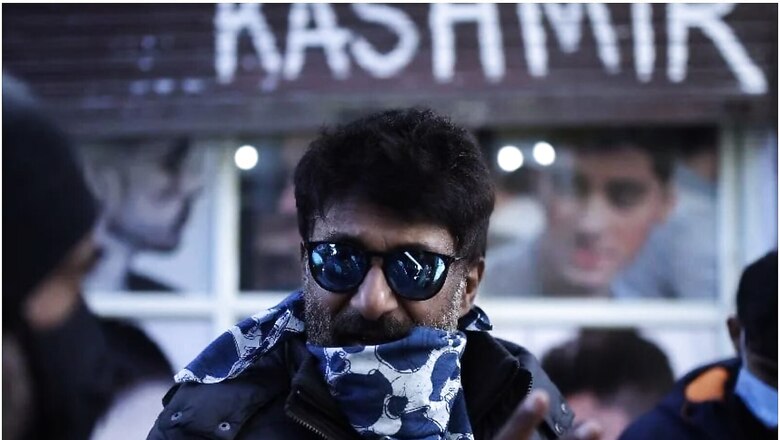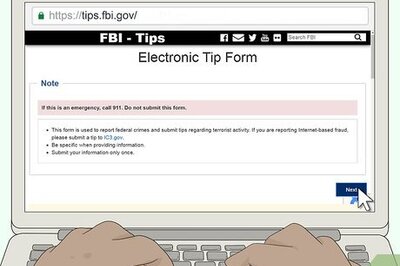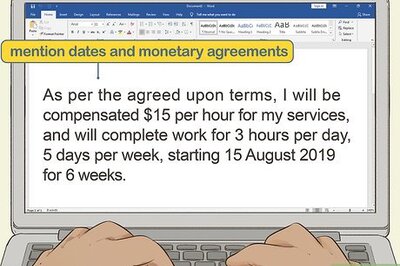
views
The Kashmir Files, releasing this Friday, is one of the most anticipated and talked about films of recent times. Filmmaker Vivek Agnihotri, who hit home with The Tashkent Files in 2019, has taken up yet another much-debated topic of Indian political history – the Kashmir Exodus. But unlike what many may presume, the director approached the subject sans any political lens. He tracked down first-generation victims of the exodus and spoke to them for hours and turned the crux of that into the film about the suffering of the people. Excerpts from a chat about how the second film in his trilogy – about truth, justice and life – came about.
Making a film on Kashmir is very difficult
“Honestly speaking, I had never thought in my life that I would make a film on Kashmir. It’s not that the idea didn’t cross my mind. A lot of people kept telling me about it. But then I said, it’s so difficult to do this research, where do you get documentation? It’s a very difficult and extremely life-threatening project. And I knew that nobody will support it, in Bollywood, nobody’s going to finance it. So it was a very difficult proposition. But in a chance meeting with a gentleman called Dr Surinder Kaul, he asked me, Vivekji, why don’t you make a film on our genocide? So I said, yeah, it can be made, but there’s so many hassles, and it’s such a complex thing. What is right, what’s wrong? Nobody knows.”
Everything you know about Kashmir is from a political lens
“He said, but Vivekji, if you are also going to say that it’s complex, nobody knows what’s right and wrong, then somebody should take a journey to find out what is right. If you won’t, who else will do it? And that really shook me up and I said, Okay, let me study this, at least. I tried to study the subject deeper and realized, to my surprise, that whatever we know, on Kashmir – whichever side you are, doesn’t matter whether you are the perpetrator, or a terrorist, a victim or a politician, or an indifferent 12th standard youth who just wants to know the truth – everything you know about Kashmir is from a political lens. There has only been political narrative and political reporting of this subject.
My film is not about Hindu or Muslim
But it’s a human tragedy of unimaginable proportion. Nobody has ever spoken about the human side of the story. Nobody has ever spoken about, when you allow terrorism to enter any society, what do you lose? You just don’t lose lives. You lose thousands of years of cultural heritage. You lose diversity. Do you know that musicology as a science was started in Kashmir? Patanjali’s yoga was written in Kashmir. So many films used to be shot in Kashmir, all great concerts used to take place in Kashmir, but today, there is not even one cinema hall. There is no new architecture in Kashmir. Whose loss is this? Is this the loss of Kashmir? Or is this the loss of India? Or is this the loss of humanity, that you lost such great knowledge? That is what my film is all about. It’s not about Hindu or Muslim like people would want to believe.
Broken people don’t lie
I didn’t care about any politics. Surinder Kaul ji actually challenged my conscience. After that, Pallavi (Joshi, actress) and I decided, we should know the truth. And the best way to know the truth is from the people who have lost something, who have suffered, because broken people don’t lie, when their hearts are crying. And most of these Kashmiri pundits who are settled in the US, UK, South Africa, they are indifferent to politics. We traveled for years and conducted personal interviews of the first generation victims of Kashmiri genocide.
Will turn hours of footage of interviews of first generation victims into a documentary
We would go and stay with them, talk to them, eat with them, play with their children, to the point when they actually trusted us and opened up. Then we would just put the camera in front of them, and let them speak for hours and hours and hours. Sometimes we had interviews running into one and a half to two days. And then we found the most common things. Once we filtered that truth out, then we corroborated it with all the authentic news reporting, government documentation and the 10 most authentic books which are recognized by the world. We took out the pulp from that and shared it with the historians from both left and right. We interviewed all the government officers, the IGS, and divisional commissioners from that time. Then we just took that story, put it in a new timeline, and to respect the dead and the victims, we changed the names with their permissions. I am in the process of turning all that footage into a documentary.
Read all the Latest Movies News and Breaking News here

















Comments
0 comment